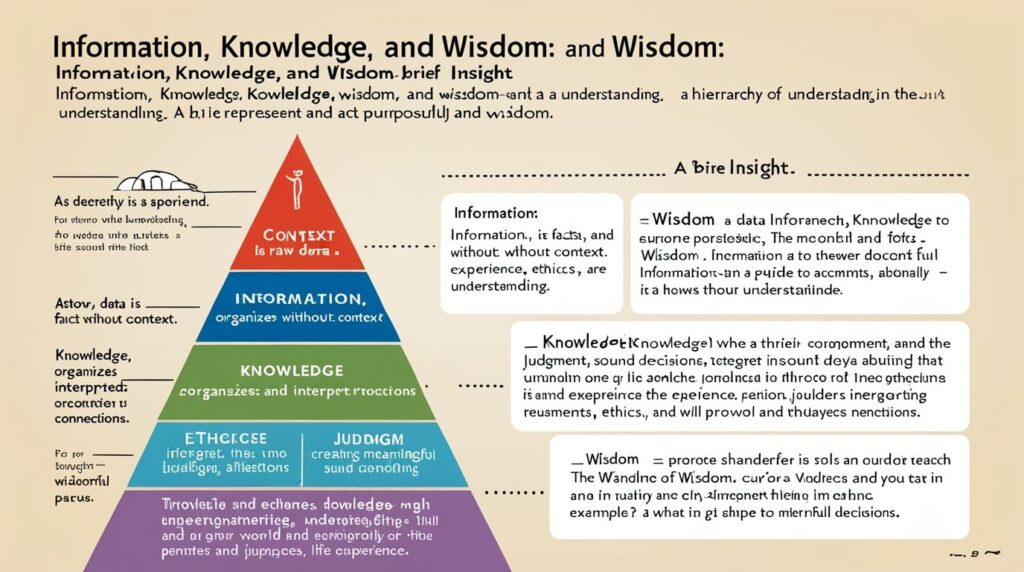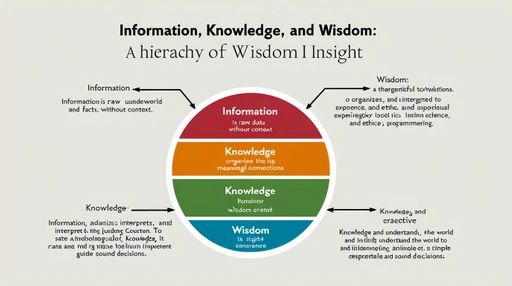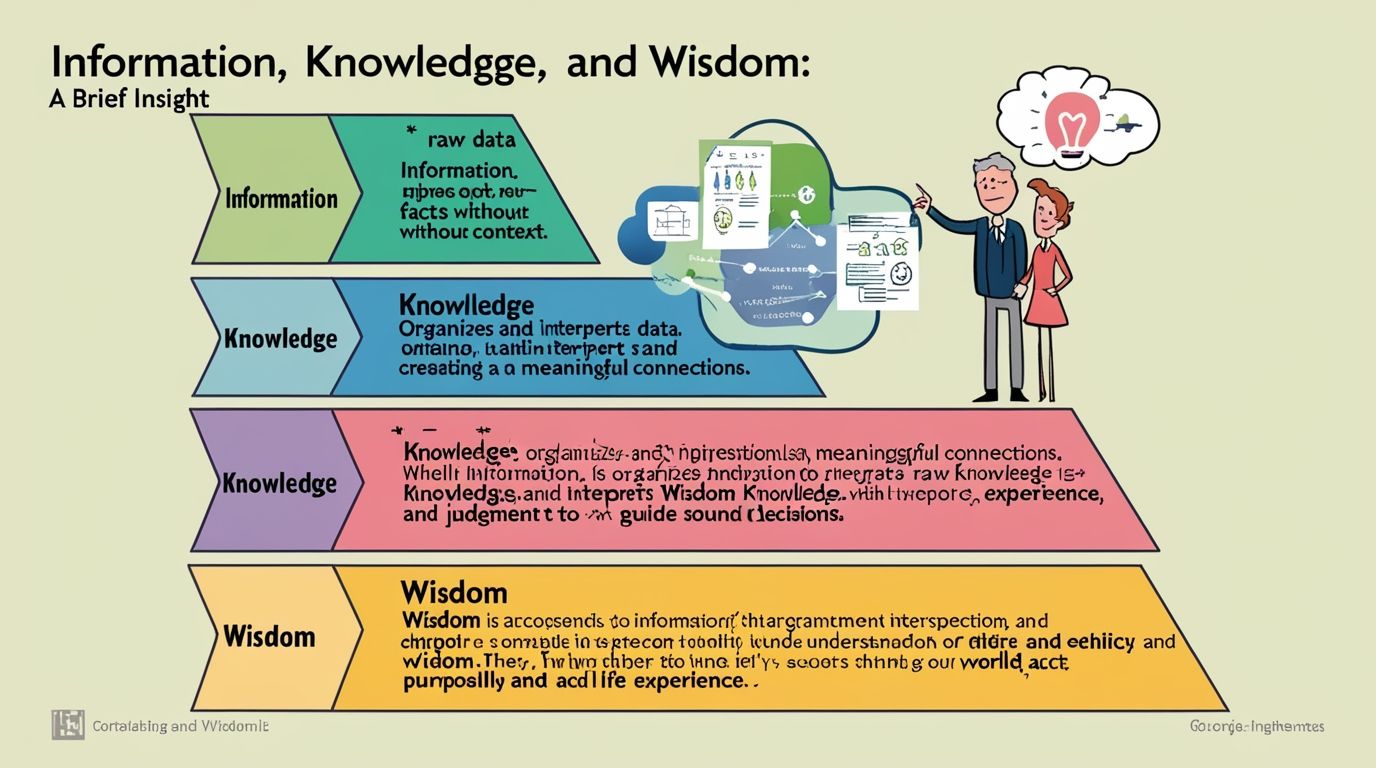Information, Knowledge, and Wisdom, In an age dominated by the digital revolution, the distinction between information, knowledge, and wisdom has gained critical importance. These three concepts, often used interchangeably, form a hierarchy of human cognition and understanding. While they are interrelated, their differences lie in the depth, context, and application of what is learned or acquired. This article explores their distinctions and interplay in detail, emphasizing their unique roles in shaping our understanding of the world.
Information: The Foundation of Awareness
Information is the raw material of cognition, consisting of unprocessed data, facts, or details about an event, object, or phenomenon. It is the most basic form of understanding, often devoid of interpretation or context. For instance, a weather report stating, “The temperature is 30 degrees Celsius,” represents pure information. It tells us what is but not what it means or why it matters.
The rise of the internet and digital media has exponentially increased access to information. Yet, this abundance often leads to information overload, where quantity undermines quality. Without structure or context, information can become overwhelming, misleading, or even irrelevant. A prime example is the spread of misinformation on social media, where unchecked facts circulate rapidly, causing confusion rather than clarity. Thus, while information is foundational, it requires further processing to be meaningful or useful.

Knowledge: Contextualized and Structured Understanding
Knowledge is the next step in the hierarchy, representing the organization and interpretation of information to produce understanding. It is formed when information is analyzed, contextualized, and connected to existing frameworks of thought. Knowledge transforms discrete facts into coherent systems, enabling individuals to draw conclusions and make informed decisions.
For example, understanding that a 30-degree Celsius temperature is considered warm and can impact outdoor activities demonstrates knowledge. It goes beyond stating a fact to interpreting its significance. This level of cognition often requires effort, such as studying, reflecting, or applying critical thinking skills. In academic or professional contexts, knowledge is cultivated through education, research, and practical experience.
However, knowledge is not without limitations. It can be biased, incomplete, or misinterpreted depending on the sources and methods used to acquire it. Furthermore, knowledge alone cannot guarantee sound judgment or ethical decisions, as it lacks the element of wisdom—an essential component for applying knowledge effectively.
Wisdom: The Pinnacle of Understanding
Wisdom transcends information and knowledge by incorporating experience, insight, and ethical judgment. It involves not just understanding facts and concepts but also discerning the best course of action in complex or uncertain situations. Wisdom requires a deep awareness of the broader implications of decisions, integrating emotional intelligence, empathy, and moral values.
For instance, a wise person considers not only the immediate impact of high temperatures on outdoor activities but also the long-term effects of climate change on global ecosystems. Wisdom enables individuals to foresee consequences, prioritize actions, and navigate ambiguity with clarity and purpose. Unlike information and knowledge, wisdom is rarely acquired solely through formal education; it is often the result of life experiences, introspection, and the cultivation of virtues like patience and humility.
Wisdom also emphasizes the importance of applying knowledge in service to others or for the greater good. This perspective differentiates it from knowledge, which can sometimes be used selfishly or irresponsibly. For example, technological advancements driven by scientific knowledge must be guided by wisdom to ensure ethical and sustainable applications.

The Interrelationship: Building a Cognitive Hierarchy
The relationship between information, knowledge, and wisdom is hierarchical yet dynamic. Information serves as the foundation, providing the raw data necessary for constructing knowledge. Knowledge builds upon this base by organizing, interpreting, and contextualizing the data. Wisdom, in turn, represents the culmination of this process, enabling individuals to apply their understanding in meaningful and ethical ways.
This hierarchy illustrates that while information is plentiful, wisdom is rare. In contemporary society, the challenge lies in navigating the vast sea of information to extract meaningful knowledge and ultimately cultivate wisdom. This journey requires not only intellectual effort but also a commitment to personal growth, ethical principles, and critical thinking.
Conclusion: Distinction and Integration
Understanding the differences among information, knowledge, and wisdom is crucial for personal development and societal progress. While information equips us with facts, knowledge provides structured understanding, and wisdom guides us toward purposeful action. Each plays a vital role in shaping our decisions and interactions, yet their integration is what ultimately empowers individuals and communities.
As we continue to navigate an information-rich era, the pursuit of wisdom should remain a priority. By fostering critical thinking, encouraging lifelong learning, and cultivating ethical judgment, we can bridge the gap between knowing and understanding, ensuring that our cognitive abilities serve both personal fulfillment and the collective good.

3 thoughts on “Information, Knowledge, and Wisdom”
Comments are closed.